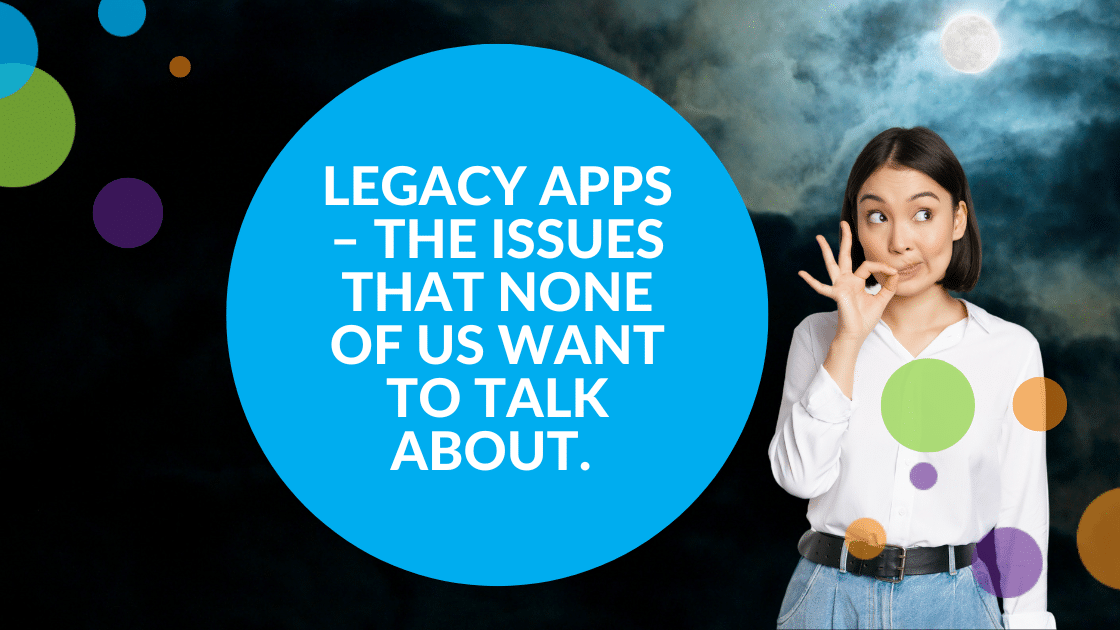Legacy Apps – The issues that none of us want to talk about.
Applications are the life blood of any EUC environment. Without the applications that enable the users to perform their business functions, the EUC environment would just be some expensive infrastructure. Applications however can also be one of the single biggest challenges that face the infrastructure owners and create very big headaches when they fall in that feared category of legacy. Lets talk about this!!
Speaking with customers about their EUC environments, legacy applications are without doubt the biggest blocker that many are facing. They can present security risks, higher operational and administrative costs, and hinder modernisation.
For many legacy applications, they may only be supported of specific versions of Windows operating systems that are no longer in support. As a result, organisations are forced to not only keep legacy applications but also legacy Windows operating system. We are regularly come across customers who are still running mission critical business applications on Windows Server 2003. These operating systems are no longer receiving important security updates, have many known exploits and will not work with modern applications
As a result, they are then at higher risk of security incidents that can lead to data loss, ransomware or even a complete loss of service. To try to mitigate these risks as much as possible, organisations usually end up placing their legacy applications in isolated silos and only allow the minimum level of network access for them. Some organisations can end up investing in network segmentation technologies to further isolate their legacy applications. It is often the case that this is a more cost-effective approach than application remediation or replacement.
For organisations with more limited resources, who do not have the capabilities to isolate the legacy applications and need to run it in full production, the application is then becoming a blocker to their ability to uplift operating systems that their end users are on. Not only are they then facing some of the same security risks that were mentioned above, but their ability to innovate and modernise their digital workspace is stopped in its tracks.
Without being able to upgrade, organisations find themselves unable to take advantage of the latest versions of modern productivity and collaboration tools, and instead find themselves dependent of earlier versions of clients that are not supported for certain services. A good case in point here is older versions of Microsoft Outlook trying to connect to Exchange Online.
Organisations are then finding themselves in a vicious circle of being unable to upgrade and instead constantly having to come up with band aid solutions, all the while not being able to progress on their digital workspace journey.
At Enterprise Solutions, we have daily conversations with organisations about these risks and how best to overcome them. Don’t feel like your the only organisation in this situation and there are a number of legacy app solutions out there which our EUC consultants would be happy to talk to you about while taking a technology agnostic approach. Contact us to speak to one of our experts and avoid the dangers legacy applications may put on your organisation. Its ok to talk about it!!!

Shane O’Neill is a Citrix CTP/ EUC Architect here at Enterprise Solutions. He loves automation. Shane is constantly coding in C# and PowerShell to create new tools to make his life and that of other Citrix admins easier, and to fill in the gaps in automation and reporting that Citrix doesn’t currently provide. Holding certifications in Citrix, VMware, Cato Networks, Microsoft and Hyper-V to name just a few. Shane was named one of the first Citrix Technology Advocates in 2016 and has held the title of Citrix Technology Professional since 2019, one of only 60 worldwide.




